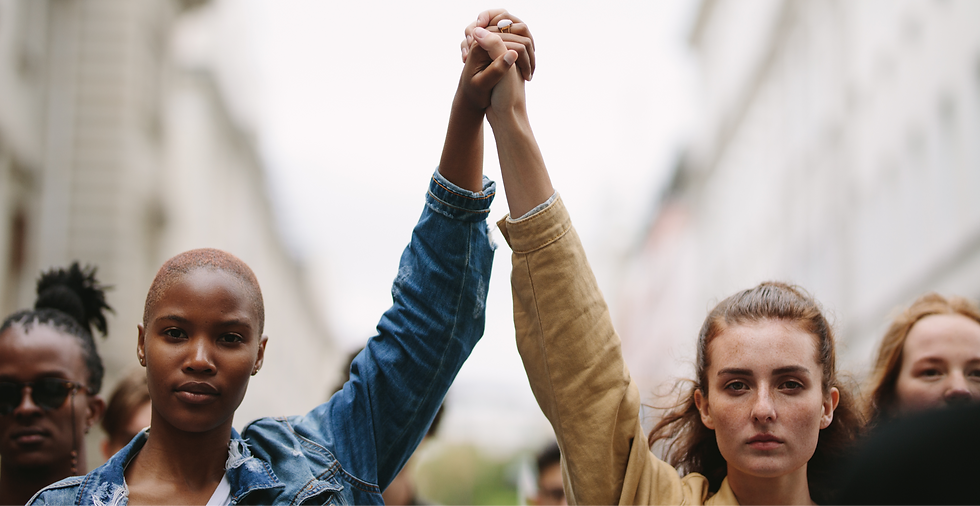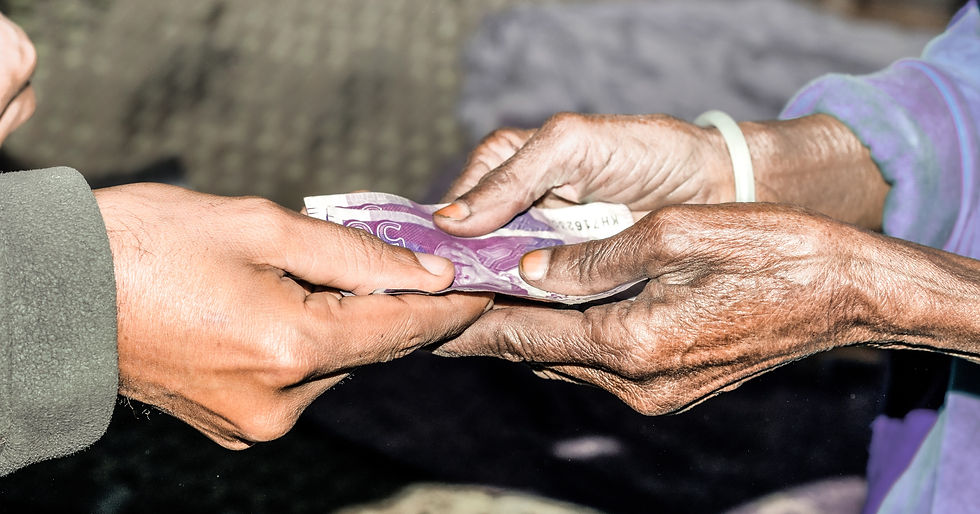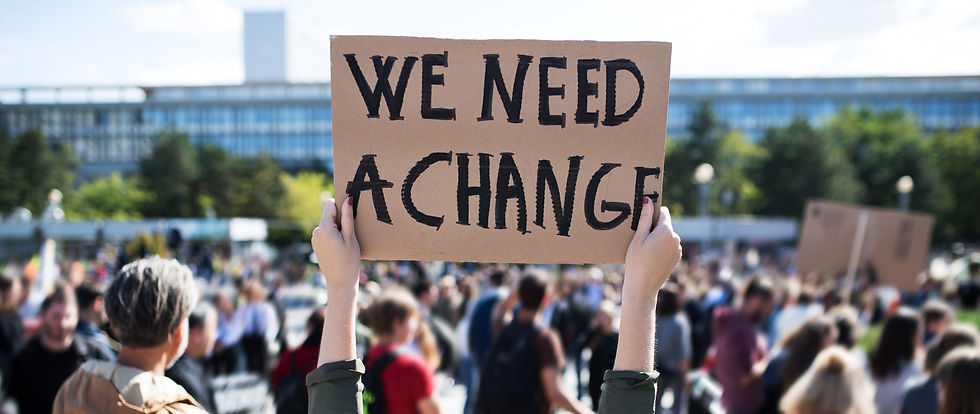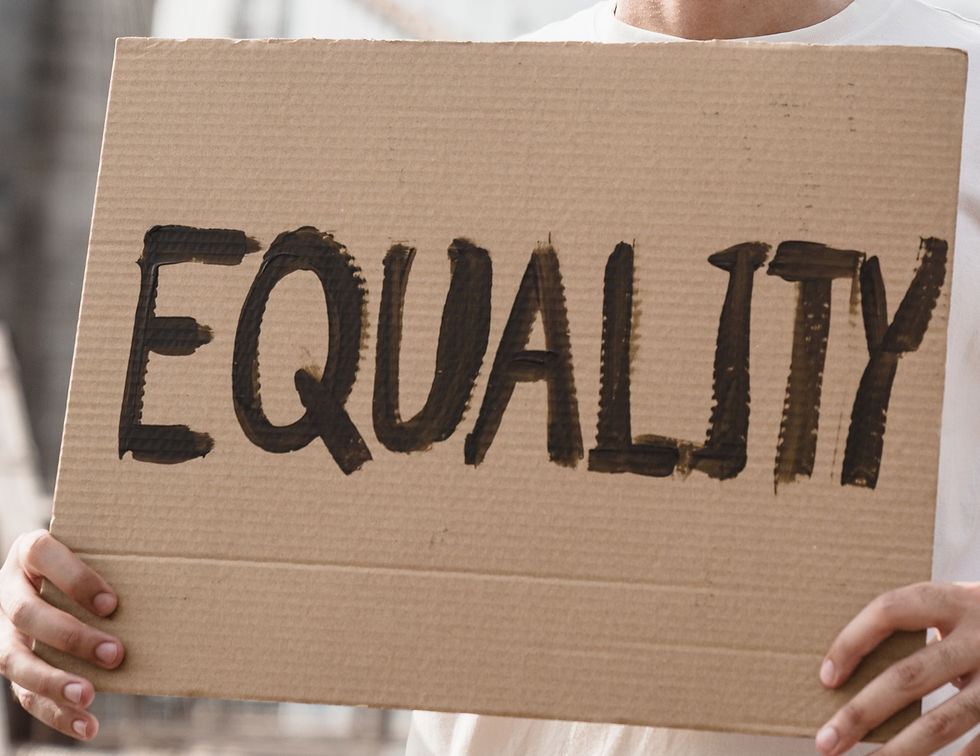Empowering Women is the Climate Crisis Solution
- Syd

- May 24, 2023
- 10 min read
Updated: May 15, 2024

“Even though girls are significantly impacted by climate change, they are also powerful agents of change, capable of strengthening a country’s response to climate change.” - The NGO Plan International 2021 report.
The effects of climate change are rapidly accumulating, and it is the marginalized and vulnerable populations who bear the most immediate brunt of its impact.
Unsurprisingly, it is the women of these populations who are disproportionately affected, facing harsh realities that demand our attention.
This article examines modern day experiences of gender inequalities, their consequent effect on environmental collapse, and the transformative power of educating girls and women, highlighting their incredible potential to drive climate action and create a more equitable future.
No, Women Still Aren't Equal... Sorry.
I navigate through my own experiences of the female gender from a place of privilege. I am young, white, middle class, American, educated, and pretty enough by the standards of society.
I've been slighted, belittled, underestimated, made to feel unsafe by entitled men. I've been told to believe that my only purpose is to be an object of sexual desire, though to make sure I keep in mind that I'm actually not quite sexy enough to be desired, as well as to remember that simply existing in a female body has made me inherently dirty and bad.
Oh well, that's the rub. All and all, 27 years in and it's been a good run so far.
Feminism: More Than Nipples
I would say that I’ve always been a feminist, “free the nipple” and all that, and while the importance of speaking up against female body censorship is critical, as I’ve come into deeper and more independent womanhood my perspective has been widened.
Maybe it is in light of my rights being stripped away in my home country of the United States that my eyes have been further opened to the harsh realities that my gender face globally.
Maybe it is because I have been privileged enough to travel and witness firsthand the contrast between poor countries and rich countries.
Maybe because, as I grow more interested in building my business and in building a strong financial future for myself, the accumulation of educational resources in my arsenal all point to that women are still overwhelmingly left out of the financial conversation.
I would guess that it is a combination of all of this, and more.
Throughout these experiences, one thing becomes glaringly apparent: The urgent need for women's empowerment.
The Rich Get Richer, The Rest...

Climate change is coming for us all (grim, though true), but the consequences disproportionately affect those least responsible for the problem.
While the ultra wealthy who fuel environmental and social degradation can still afford to live in denial (and continue to line their pockets by doing so), it is the world’s lower income people and indigenous communities who suffer the rapidly accumulating consequences.
It is overwhelmingly women facing said consequences.
Take Fast Fashion, For Example
As a person with career focus in sustainable fashion, the best example I am equipped to give (though there are many) is that of fast fashion. A colonialist industry built on the backs of non-white women and girls in developing countries. These individuals endure working conditions that are not only perilous but also degrading, all while receiving wages far below what is legally mandated, let alone sufficient for a decent standard of living.
The higher purpose behind their suffering? The production of fleeting fashion trends destined to be worn once and discarded, marketed primarily to women and girls in higher income countries, sold to supplement a rich white man's yacht, and ultimately returned to the developing countries as a thoughtless method of waste relocation which further disrupts local industries, economies, and environments.
Amidst this complexity, a key component of the solution emerges as a straightforward yet impactful step: the education and empowerment of women and girls. By equipping them with knowledge and skills for financial independence, sexual health, safety, and their vital role in climate action, we can pave the way towards breaking the cycle of poverty and promoting sustainable development.
The Phenomenal Effects of Educating Women
On Climate Change and on Society as a Whole

Amplifying Resilience and Safety
Natural disasters have a profound impact on women, exacerbating existing gender inequalities and creating new challenges that disproportionately affect them. In times of disaster, women face heightened risks to their safety, well-being, and overall empowerment. This is due to a combination of social, cultural, and economic factors that intersect with the effects of the disaster itself.
According to Women’s Agenda, Women are 14 times more likely to be killed in a natural disaster than men. For the girls and women who survive these disasters, their fate often isn’t much brighter. Many are met with poverty, forced marriage in exchange for a small financial sum (an act of desperation from families in need of money), and sexual violence in the disasters aftermath.
Gender Based Violence
One significant threat that women face during and after natural disasters is an increased risk of violence. Disruptions to social structures, breakdown of law enforcement, and overcrowded living conditions in temporary shelters create an environment where women become more vulnerable to physical and sexual violence. Women may also be targeted for human trafficking or forced into marriages as a means of survival, especially when their families are in desperate situations and facing economic hardships.
Limited Access to Resources
Moreover, women often have limited access to resources in disaster-affected areas. This can include inadequate access to clean water, sanitation facilities, healthcare services, and essential supplies.
Limited mobility, cultural norms, and unequal power dynamics can restrict women's ability to access these resources, leaving them at a greater disadvantage in post-disaster recovery and resilience-building efforts.
Education plays a crucial role in addressing these challenges and empowering women in disaster-affected communities. By providing women with access to education, they gain knowledge, skills, and awareness to advocate for their rights and make informed decisions. Education equips women with the tools and information they need to actively participate in disaster preparedness, response, and recovery processes. This includes understanding their legal rights, accessing support services, and actively engaging in community resilience-building initiatives.
Furthermore, education helps challenge harmful gender norms and stereotypes that perpetuate inequalities and limit women's roles in disaster response efforts. By promoting gender equality and empowering women through education, communities can break down barriers and create more inclusive and effective disaster response systems.
Educated women are better equipped to challenge traditional gender roles, demand equal representation, and actively contribute their perspectives and expertise in decision-making processes.
Ensuring female students' access to attend secondary school as well as to receive a tertiary education not only empowers individual girls by expanding their knowledge, skills, and opportunities but also contributes to broader societal development. When girls receive quality education, they are more likely to break the cycle of poverty, make informed decisions about their health and well-being, participate in the workforce, and become agents of change within their communities.
Unlocking Potential and Agency
Educated women are powerful agents of change. Their voices and perspectives contribute to more effective climate responses. By promoting education, we harness the potential of women to develop innovative solutions, advocate for sustainable practices, and drive community engagement. Empowered women create a ripple effect, inspiring others to take action and leading to transformative change.
Investing in girls' education nurtures future leaders who will shape a sustainable world. By providing girls with quality education, we equip them with the knowledge and skills to address climate challenges head-on. These educated young women become catalysts for change, driving innovation, policy reform, and community resilience in the face of climate change.
Education + Financial Independence = Climate Solutions
(Quick Maths)

Women's education is a crucial player not only in breaking the cycle of poverty, but also in promoting sustainable development.
It has been widely recognized that investing in girls' education yields significant social and economic benefits, not only for the individuals themselves but also for their families, communities, and society as a whole.
One of the most extraordinary outcomes that arises from providing women with formal education is the life altering empowerment of financial independence.
Money Can Buy Happiness
The age old “money can’t buy happiness” simply isn’t true.
It is precisely a severe lack of financial resources that leaves women in such vulnerable positions to begin with. People without financial independence have no headspace to think beyond day to day survival. Who can bother with education of any sort when they or their children are starving? Of course, if one remains uneducated, the poverty cycle continues.
Poverty: Education's Gatekeeper
Poverty and gender inequality are deeply intertwined, with climate change exacerbating these challenges.
While poverty knows no gender, evidence via Research Gate shows that an astonishing 70% of those experiencing poverty globally are women, and they are largely women of color.
Furthermore, while there are already plenty of educational barriers girls face, environmental issues aside, climate change exacerbates them. That may be in the form of lacking money for school fees, for menstrual hygiene products, and even the increase in caregiver roles (roles which are predominately taken by women) that arise post-natural disaster. These are just to name a few.
If trends continue as they have been, the NGO Plan International estimates that by the year 2025 climate change will contribute to preventing a minimum of 12.5 million girls from completing their education all together.
Financial Independence is Essential to Empowerment
When women are educated and equipped with the necessary knowledge and skills, they are better positioned to secure stable employment, start businesses, and generate income. This financial independence allows them to overcome vulnerabilities associated with poverty and make informed choices about their lives and the lives of their families.
By gaining access to quality education, girls and women can transcend the limitations imposed by traditional gender roles and societal expectations. Education broadens their horizons, expands their opportunities, and ultimately equips them with the necessary skills to actively participate in sustainable initiatives.
Other Education Outcomes
In addition to economic empowerment, education provides girls and women with a range of other benefits.
It enhances their critical thinking abilities, problem-solving skills, and decision-making capacity. Education also promotes self-confidence, self-esteem, and a sense of agency, enabling women to navigate societal challenges and advocate for their rights. It fosters gender equality by challenging harmful norms and stereotypes, promoting equal opportunities, and breaking down barriers to women's participation in various spheres of life.
Statistically, educated women tend to be more likely to invest in their families' well-being, including the health, education, and nutrition of their children. Studies have shown that when women have access to education, they are more likely to make informed decisions about family planning, leading to smaller and healthier families. This, in turn, has a positive impact on poverty reduction and sustainable development, as smaller families can allocate more resources to each child's education, health, and overall well-being.
Global Initiatives
(The Nitty Gritty)

The United Nations Population Fund (UNFPA) and the Paris Climate Agreement are two distinct global initiatives that address different aspects of global challenges. However, they both intersect with the broader goal of achieving gender equality and recognizing the role of women and girls in addressing climate change.
The United Nations Population Fund
The UNFPA is the United Nations agency dedicated to reproductive health, gender equality, and population issues. It works to ensure that every pregnancy is wanted, every childbirth is safe, and every young person's potential is fulfilled. The UNFPA recognizes the importance of gender equality in achieving sustainable development. They also advocate for women's rights, including access to education and reproductive health services, which subsequently reduces pressure on natural resources.
By promoting girls' education and empowerment, the UNFPA contributes to the broader agenda of gender equality and addresses the barriers that hinder girls' access to secondary education.
The Paris Climate Agreement
The Paris Climate Agreement, on the other hand, is an international treaty adopted by the United Nations Framework Convention on Climate Change (UNFCCC). Its primary objective is to combat climate change and limit global warming to well below 2 degrees Celsius above pre-industrial levels. While the agreement does not explicitly focus on gender equality, it recognizes the importance of gender-responsive climate action and the role of women in addressing climate change. It emphasizes the need to promote gender equality, empower women, and engage them in decision-making processes related to climate change mitigation and adaptation.
The Paris Agreement acknowledges that gender equality is essential for effective climate action and sustainable development.
If Not Us, Then Who?
This pervasive narrative of women as the "lesser gender" has plagued societies worldwide, hindering their progress and potential. It spans across religions, ethnicities, and wealth divides. The resultant deprivation of access to many things, not the least of which being educational opportunities for girls and women is a tragedy that leaves everyone (save, say, the oppressors themselves) worse off.
Those of us who have been fortunate enough to bear the least brutality of oppression's impact cannot afford to be complacent or silent.
The systematic change that achieving true intersectional gender equality necessitates requires individual action on a mass scale. Action as seemingly small as being conscientious of the clothes that we buy, participating in local actions, and fostering conversations about the cruciality of women's education globally. The responsibility lies primarily on the bigger systems at play, but it is the culmination of our individual efforts that will overthrow the status quo.
In these dire situations where both human rights and the survival of our very planet are on the line, when it comes to taking action we must ask ourselves what was first proposed by civil rights activist John Lewis, "If not us, then who? If not now, then when?”
Achieving Gender Equality is a Collective Effort

To achieve gender equality, it is imperative to challenge and dismantle the lesser gender narrative. Women must reclaim their voices, asserting their rights and capabilities with unwavering determination.
Feminists Come in All Genders
A collective effort from individuals, communities, and institutions is required. It necessitates dismantling patriarchal structures and biases ingrained in society.
Men must be allies in this journey, recognizing the importance of equality and actively working to challenge oppressive norms. It is essential to promote intersectionality, acknowledging that women's experiences vary based on factors such as race, ethnicity, socioeconomic status, and more. An inclusive approach ensures that all women, regardless of their background, are afforded equal opportunities and support.
The Time to Act Is Now

The need to challenge and dismantle societal narratives that perpetuate oppression and undermine the true potential and capabilities of individuals and communities is urgent.
Our fight against climate change requires an inclusive approach that prioritizes gender equality and education for all. It means acknowledging the education of girls and women as not only an investment in their future but also in the future of our planet.
By empowering women worldwide, we tap into their immense potential as agents of change, breaking the shackles of poverty, amplifying resilience, and fostering sustainable practices. Let us recognize the urgency and seize the opportunity to educate and empower girls and women, unleashing their power to combat climate change and build a more equitable and sustainable world for all.



Comments